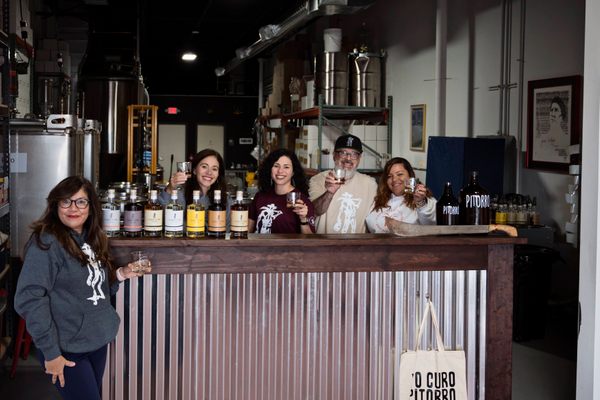Prohibition, Moonshine, and an Underground Secret
Dutch Schultz’s legacy of liquor.

Dutch Schultz, whose given name wasn’t Dutch Schultz, had a lot of secrets.
Fatally shot in 1935 while urinating at the Palace Chop House and Tavern in Newark, Schultz was a noted gangster in a time of noted gangsters, when men such as Charles “Lucky” Luciano and Benjamin “Bugsy” Siegel walked the Earth. And, like many of his peers, Schultz had a lot of business interests, one of which was bootlegging, an activity which made a lot of criminals rich. Schultz was also, authorities later found out, running an underground distillery in Pine Plains, New York, that was largely forgotten until recently.
Today, that distillery is operating again under the name Dutch’s Spirits, and its CEO, Lydia Higginson, says that the new—completely legit, this time—operation is still unearthing the remnants of Schultz’s original activities. “There’s some critters down there,” Higginson said, referring to a system of underground bunkers (and the animals that populate them) that Schultz used to conceal his distillery from the prying eyes of the feds.
The bunkers have since been excavated and opened to visitors, but before 2010 they were mostly a local rumor. Like a separate rumor of buried treasure in nearby Phoenicia, they might’ve just lived on as an urban legend, had the owners of the site not done some digging and rediscovered the reason why agents, in 1932, raided what appeared to be a quiet Hudson Valley farm. Some 15,000 gallons of mash and two 2,000-gallon stills were destroyed in the process, though Schultz himself somehow avoided charges.
All of this suggests that Schultz, who was 33 when he died, probably would have liked that his eponymous liquor operation is up and running again, at the site where he first built one. He’d have appreciated the attention, too, since like a lot of gangsters of his era, Schultz liked publicity. He had even changed his given surname, Flegenheimer, to Schultz, because the latter “was short enough to fit in the headlines.”
Schultz also, at one point, became something of a media critic, after seeing some language he disliked in The New York Times. Schultz, the paper wrote in a 1933 story, was “a pushover for blondes,” a fact that Schultz himself did not dispute. His beef, rather, was that the phrase appeared in what ostensibly was a family newspaper. ”I only remember it made me feel bad when I saw it in The Times,” Schultz said then. “I don’t think ‘pushover for a blonde’ is any kind of language to write for a newspaper like The Times.”
A little over two years later, Schultz was dead, the victim of a hit by other mobsters, who were angry that he did not agree to abandon his plan to assassinate the prosecutor Thomas E. Dewey (who died, of natural causes, in 1971).

Still Schultz’s legacy lives on, in the form of a largely unsourced Wikipedia page and in Dutch’s Spirits, a local, “farm-to-bottle” distiller that’s thriving in part because of the law, not despite it. The Farm Distillery Act, which then-governor Eliot Spitzer signed into law in 2007, has facilitated a boom in distilleries across the state, including Dutch’s Spirits, which was founded in 2010 and made a name for itself selling moonshine. Higginson says that the current governor, Andrew Cuomo, has continued to encourage the development of such small distilleries. “I think Governor Cuomo realized that this would be another value-added product,” she said. “I’m not saying it’s easy by any stretch of the imagination, but it does facilitate the growing of crops and the ability to do it.”
For now, however, the distilling takes place off-site, while corn and soon rye are being cultivated on site, where there’s also a tasting room. A 12,000-square-foot barn intended to house stills is in the works. The ghost of Schultz, meanwhile, still lurks, providing something of a competitive advantage, though Higginson says that any rivalries (two other distilleries operate in Dutchess County alone) are pretty friendly.
“When I try to explain to Europeans that our country could not legally drink for 10 years their eyes light up,” she says, adding what she thinks makes Dutch’s unique “It’s the moonshine and our history.”
You can visit Dutch’s Spirits and explore Dutch Schultz’s Prohibition-era operation on Obscura Day, May 6, 2017.










Follow us on Twitter to get the latest on the world's hidden wonders.
Like us on Facebook to get the latest on the world's hidden wonders.
Follow us on Twitter Like us on Facebook